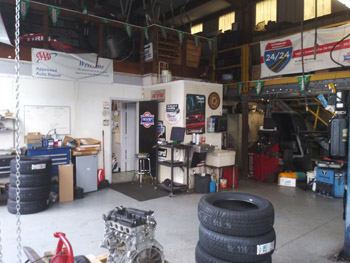All Categories
Featured
Normal engine tune-ups are important for preserving your car's efficiency, enhancing fuel efficiency, and expanding its life-span. Whether you're an experienced automobile owner or a beginner, recognizing the crucial aspects of an engine tune-up can help you maintain your cars and truck running efficiently for several years. Here are some important suggestions to assist you with the procedure.
- Change the Flicker Plugs. Trigger plugs are small but magnificent components that play a critical duty in stiring up the fuel-air mixture in your engine. Gradually, they can wear out or become fouled, leading to poor engine performance, decreased fuel efficiency, and difficult beginnings.
During a tune-up, inspect your ignition system for wear and change them as essential. For the majority of automobiles, ignition system should be replaced every 30,000 to 100,000 miles, depending on the type and material. Fresh spark plugs make certain effective combustion and smoother engine operation.
- Examine and Replace the Air Filter. The air filter is your engine's very first line of defense versus dust, particles, and various other impurities. A stopped up or dirty air filter can restrict airflow, triggering your engine to work more difficult and take in more gas.
Inspect your air filter throughout a tune-up and change it if it's dirty or previous its advisable solution interval. A tidy air filter boosts engine performance and boosts gas economy.
- Examine the Gas System. Over time, your gas system can gather dust and carbon deposits, minimizing engine efficiency and gas performance. Cleansing the gas injectors and fuel lines during a tune-up assists keep appropriate fuel delivery and burning.
You can utilize a gas system cleaner or have a professional mechanic execute an extra thorough cleansing. This step is particularly beneficial for older vehicles or cars often driven in stop-and-go traffic.
- Inspect the Belts and Hose pipes. Belts and tubes are essential for numerous engine functions, such as running the generator, water pump, and air conditioning. During a tune-up, look for cracks, fraying, or signs of wear on these elements.
Change any kind of damaged belts and pipes to stop possible failures. A broken belt or dripping pipe can cause engine getting too hot or loss of power, so addressing these problems immediately is essential.
- Change the Engine Oil and Oil Filter. Engine oil is essential for lubing relocating parts, lowering friction, and regulating engine temperature level. Over time, oil ends up being contaminated and sheds its efficiency.
As part of a tune-up, change the engine oil and oil filter. Make use of the kind of oil advised by your vehicle's manufacturer and adhere to the recommended adjustment intervals. Clean oil keeps your engine running smoothly and stops premature wear.
- Check the Battery and Charging System. A healthy and balanced battery is vital for starting your vehicle and powering its electric systems. Throughout a tune-up, examine the battery's voltage and evaluate the terminals for deterioration. Clean the terminals if needed and make certain a secure connection.
Additionally, test the generator and charging system to guarantee your battery remains charged during procedure. If your battery is weak or old, consider replacing it to prevent unanticipated breakdowns.
- Flush and Re-fill the Coolant. The cooling system regulates your engine's temperature level, preventing it from overheating. Old or contaminated coolant can lose its efficiency, resulting in potential engine damages.
During a tune-up, purge the old coolant and replace it with a fresh combination. Additionally, inspect the radiator, thermostat, and hoses for leaks or damage. Maintaining the air conditioning system in excellent problem ensures your engine operates at the best temperature.

- Address Caution Lights and Uncommon Symptoms. Modern vehicles are geared up with analysis systems that notify you to prospective problems via dashboard caution lights. If your check engine light or any type of various other cautioning indications are on, address them throughout your tune-up.
In addition, pay focus to uncommon symptoms such as strange noises, rough idling, or reduced gas efficiency. An expert auto mechanic can diagnose and settle these issues throughout the tune-up process.
- Don't Fail To Remember the Exhaust System. Your car's exhaust system gets rid of dangerous gases from the engine and makes sure correct discharges. Evaluate the exhaust system for leaks, corrosion, or damages throughout a tune-up. A defective exhaust system can impact engine performance and cause environmental and safety and security issues.
- Usage High-Quality Parts and Fluids. When replacing parts or completing liquids throughout a tune-up, always decide for top notch items that meet your car's specifications. Using subpar parts or wrong fluids can negatively influence your engine's efficiency and longevity.
Conclusion: Normal Tune-Ups Are Key to Engine Health. Making the effort to tune up your engine guarantees it operates efficiently, saves fuel, and minimizes the danger of malfunctions. Whether you do these tasks yourself or depend on a trusted auto mechanic, routine tune-ups are an investment in your automobile's dependability and long life. Comply with these ideas, and you'll appreciate a smoother, more reputable ride for years ahead.
Latest Posts
Identifying When Your Car Needs Skilled Auto Repair at Montclare Auto Repair
Discover the Leading Auto Repair Deals in Montclare, Chicago
Explore Reduce Expenses on Car Maintenance with Montclare Auto Repair’s Limited-Time Deals
More
Latest Posts
Identifying When Your Car Needs Skilled Auto Repair at Montclare Auto Repair
Discover the Leading Auto Repair Deals in Montclare, Chicago
Explore Reduce Expenses on Car Maintenance with Montclare Auto Repair’s Limited-Time Deals
